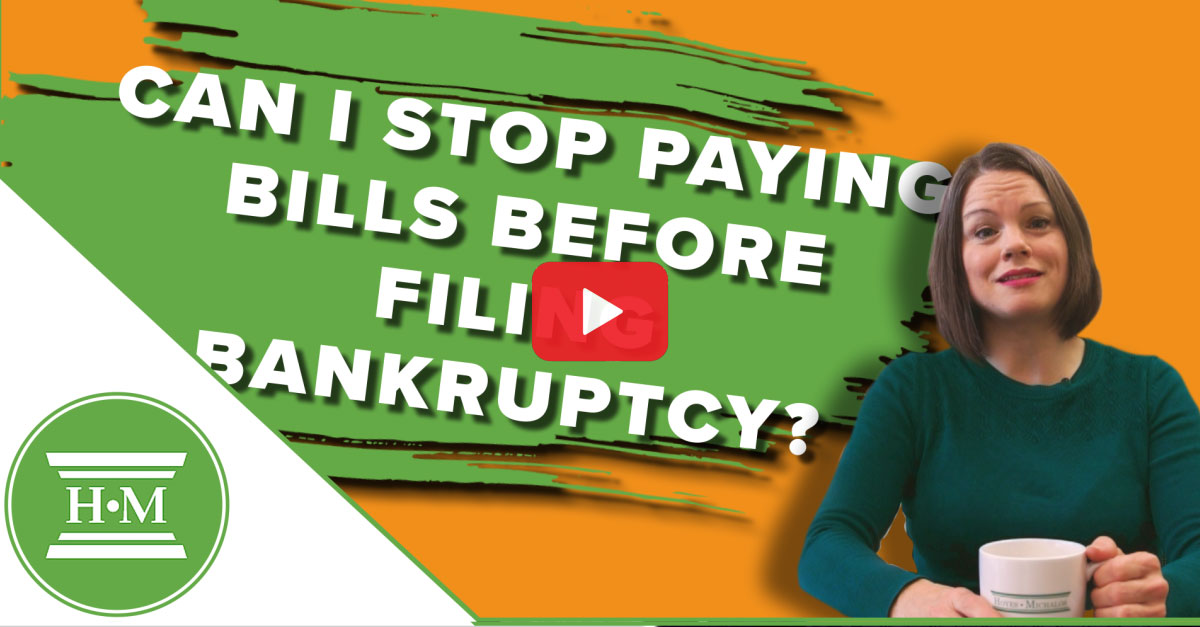
If you plan to file bankruptcy, when should you stop paying your credit cards and other bills? Can you stop paying your creditors before you file bankruptcy, or should you wait until you have signed the paperwork? The answer depends on the type of debt, and when you are planning to file.
The treatment of debts is similar for both bankruptcy or consumer proposal in Canada, so while I mention bankruptcy below, the same principle applies to paying bills before making a proposal to creditors.
Table of Contents
Unsecured creditors
You’re struggling with making your debt payments and decide that filing bankruptcy or a consumer proposal is your best option to eliminate your debt. So, the question is, can you stop paying your creditors before you file? Well, the answer largely depends on the type of debt you have and when you might file.
Hi, I’m Maureen Parent. A Licensed Insolvency Trustee with Hoyes, Michalos and Associates. A lot of my clients tend to struggle at the end of the month with running out of money because of large debt payments. Filing a bankruptcy or consumer proposal eliminates their large debt payments. But what about the period right before filing? As a rule, you can stop paying creditors who are included in your bankruptcy or proposal shortly before filing.
Technically, the types of creditors who are safe for you to stop paying are your unsecured creditors. So, yes, you can stop making the minimum payments on your credit cards and stop a repayment on your payday loan. You do want to ensure you also stop using your credit cards or incurring more debts. If you’re filing an insolvency on student loans or tax debts to CRA, you can stop those payments as well.
What you can’t stop is payments on your secured debts and debts that will remain after you file. For example, if you have a car with a bank loan or lease, you can keep the car, but you must keep making those payments before and after you file. Some other debts that are not included in a bankruptcy or proposal would be alimony, child support and court fines. You must keep making these payments.
Ask your Trustee about utilities you plan on keeping. Sometimes it’s best to keep paying to avoid having these shut off. But if you are cancelling, it may be OK to stop payment. A word of warning: you can’t stop paying months in advance. This will likely result in your creditors seeking legal options like a wage garnishment to collect.
If you’re considering filing insolvency, talk with your trustee about which debts you can stop payments on before filing and which you should maintain. For more information, come visit us at Hoyes dot com.
As a general rule, you can stop making payments to unsecured creditors or on debts included in your bankruptcy shortly before filing. So it’s safe to stop paying debts like credit cards or payday loans and avoid calls regarding collection accounts while preparing to file.
However, do not think this means you can stop paying your unsecured debts months before filing. An unsecured creditor won’t wait long for you to file before taking further action like seeking a wage garnishment.
Debt consultants often advise you to stop making payments months before completing a debt settlement or consumer proposal. This is not a good idea. Defaulting on payments if you do not eventually declare bankruptcy can have significant negative financial consequences. Your total debt will increase due to missed payments and additional interest charges. As I said, creditors may also send your account to collections, report defaults to the credit bureaus, and take legal action to enforce collection if they can. If you don’t file, you will have higher debt levels, and your credit score will fall.
Credit card debts
While you can stop making your minimum credit card payments if you know you will be filing bankruptcy, you should also stop putting new charges on those accounts. Taking on debts with the intent not to pay them back is a fraud. This is just one thing you should not do before filing bankruptcy.
If you know you will file imminently, do not take out a cash advance on your line of credit or credit cards, and stop using your cards for new purchases. Doing so could jeopardize your bankruptcy discharge and may lead to criminal charges if considered fraud. Your creditors can demand that you pay back that money even if your other debts are forgiven through bankruptcy.
Secured creditors
Bankruptcy does not deal with secured loans like a mortgage or car loan, and bankruptcy protection does not stop a secured creditor from repossessing your car or home if you are behind on payments.
That means you must keep up with your secured debt payments if you want to keep those assets.
If you are surrendering a leased or financed vehicle as part of your bankruptcy or proposal, you can contact the lender to arrange to return the car and stop making monthly payments. It’s a good idea to keep insurance on the vehicle until your auto lender picks up the vehicle.
Alimony and child support
Not all debts are dischargeable in bankruptcy or consumer proposal in Canada. Family support debts cannot be forgiven by filing bankruptcy. If you file, you will need to keep up with your monthly alimony and support payments and catch up on any arrears.
Student loans
Student loan debt is another complicated area to discuss with your trustee before filing. Private student loans, such as student credit card or line of credit, are unsecured debts. You can stop making monthly payments if you intend to file bankruptcy, and these debts will be discharged in your bankruptcy.
Canada or government student loans, however, have a waiting period. If you have not been out of school for seven years, these student loans will remain after bankruptcy. Due to the stay of proceedings provided in a bankruptcy, you can stop making payments while bankrupt (or in a consumer proposal), but interest will still accrue. In addition, Canada Student Loans may report these as late payments on your credit report. You will be required to continue payments upon completion of your proceeding.
Utility and other bills
Ongoing bill payments are a situation to be considered on a case-by-case basis. Technically utility arrears including hydro, gas, internet, cell phones and other recurring monthly payments are unsecured debt and, as such, can be wiped out when you file bankruptcy. However, some utilities will also shut off your services for arrears and may ask for a large deposit to reinstate your account.
If you need ongoing services, you will want to maintain monthly payments. When it comes to your cell phone or internet, talk with your trustee to determine the best course of action based on your situation. While Rogers or Bell will not generally cancel your service if you are up to date at the time you file, if you are significantly in arrears or want to choose a cheaper plan, it may make sense to stop paying and include those debts in your bankruptcy.
After filing
As soon as you file bankruptcy, you should immediately stop making payments to any of the unsecured creditors included in your bankruptcy. If your creditors contact you, let them know you have filed bankruptcy and give them the name of your Licensed Insolvency Trustee.
Speak with a Licensed Insolvency Trustee
If you are struggling with debt and considering bankruptcy, talk with your trustee about which debts you can safely stop paying and when. If you are certain you will file, it may make sense to stop paying your creditors and save money for necessary expenses like your rent, mortgage and living costs. If you are not sure you will file, continue to make minimum payments to avoid any further damage to your finances.





